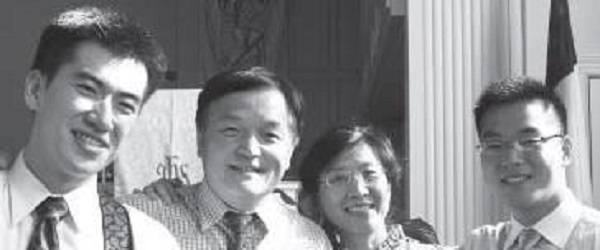Shine as salt and write blessings
[Review and Practice of Model Students of the Writing Camp]

▲Zhao Shiliang (2nd from left) and his wife have participated in the KRC camp for many years. They work together to maintain a happy home with God’s love and help many families gain happiness. In recent years, the author has been actively engaged in literary ministry, and his articles have been scattered in the Christian Tribune and other places. His two sons are his most loyal readers.
At first light, Jesus went up the mountain and began to teach the crowd and his disciples:
“Blessed are the poor in spirit! For theirs is the kingdom of heaven.
Blessed are those who mourn! for they shall be comforted.
Blessed are the meek! for they shall inherit the earth.
Blessed are those who hunger and thirst after righteousness! for they shall be satisfied.
Blessed are the merciful! for they will receive mercy.
Blessed are the pure in heart! Because they will see God.
Blessed are the peacemakers!
for they shall be called sons of God.
Blessed are those who suffer persecution for righteousness’ sake! Because the kingdom of heaven belongs to them. ”.
(Matthew 5:3-10)
Heaven is in my heart
My wife called a sister who had just lost her father and lost her job, and was in an extremely low mood under the double pressure. She took her husband and children to participate in the outdoor outing of the Bible study group. God personally comforted the pain in their lives with the scenery of singing birds and fragrant flowers and the beauty of nature.
Where is the "Kingdom of Heaven"? In the human heart? Or in the third heaven? The "Eight Beatitudes" have a domino effect. Only with humility can there be mourning, with gentleness can there be hunger and thirst for righteousness... Only with the heart of being a peacemaker can one be persecuted for righteousness. Layer by layer, people can have a relationship with others. The world has different values. In order to build the kingdom of heaven in people's hearts, Jesus used the "Eight Beatitudes" to lay a solid foundation.
God is willing to heal those who are facing storms, those who are still hurting, and those whose hearts are broken. I believe that what they need is not only courage and hard work, but also God’s grace and loving embrace.
Set the boundaries of love
A sister who married from China needs to adapt to a new lifestyle in the United States. Coupled with the cultural and language differences between China and the United States, friction with her husband continues after marriage...
Occasionally, his wife would listen to her complaints on the phone and take the initiative to express concern for her; sometimes she would take the couple to attend "marriage seminars" to help them learn: how to cultivate a high degree of empathy, how to establish an intimate relationship with God, and how to transcend The influence of the original family and how to understand each other’s love actions.
When Jesus went up the mountain, he first preached the "Eight Beatitudes" and then told his disciples that you are the salt and light of the world. First, we have the life connotation of the "Eight Blessings", and after "sincere interaction" with others, and then "setting the boundaries of love", we can develop the action of love that "shines as salt".
Indeed, setting love boundaries can avoid misunderstandings and facilitate communication. At noon, Jesus was talking to a woman by the well, not in a deserted place. Having set the boundaries of love, he was able to use the best way of communication - active listening.

Write thoughtfully, share the love
The effect of using salt to shine for the Lord varies from person to person. In some scenes, don’t be too bright or too salty, don’t have nerve lines that are too stubby, and don’t take other people’s reactions and positions into consideration. We all trust our ignorance at first and call it innocence, and we trust our innocence and call it purity. But when the Holy Spirit comes, he can bring the holiness of the Lord Jesus into our lives and make us pure without stain.
We must be more careful when shining light as salt in the service of words. The second son was born and raised in the United States, and English is his native language; the eldest son was born in Taiwan and came to the United States with his parents to study when he was ten months old. They speak Chinese at home and learn Chinese in Chinese schools. Sometimes they point out areas in my articles that are difficult to understand, and even put forward different opinions to help me improve.
Once, the second son said: "If the purpose of writing an article is to highlight that you are better than others, it would be wrong." The eldest son responded: "It is also wrong to try to instill in readers the concept of what to do. The author should share it sincerely. My own experience inspires readers to think about what they should do under God’s will and guidance so that they can express God’s grace, love, justice and fairness in words, and avoid falling into stereotypes.”
Indeed, the influence of written ministry is far-reaching and is not limited by time and space. When you feel moved, immediately record the dynamics of people and events around you, or what you see and hear in the workplace, church, and community, and actively reflect your reflections on the great times. I often remind myself: We must write about God’s deeds, because all things originate from Him, depend on Him, and belong to Him. May all glory be given to Him! From becoming a member of the KRC camp to actively engaging in literary ministry, many teachers and classmates have become good learning objects for me. In particular, Mr. Su Wen'an from the Literary Camp, who has accumulated many years of experience, has created a new work called "Reading Strange Books, Searching for the True Self", which objectively explains and comments on the four great Chinese wonders such as "The Romance of the Three Kingdoms", "Water Margin", "A Dream of Red Mansions" and "Journey to the West". The book cleverly triggers readers to have religious associations with the content in the book, and provides the dual benefits of literary appreciation and theological thinking. It is actually an example of shining as salt.
